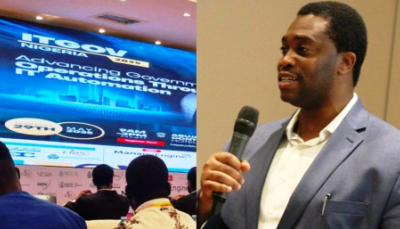Founder and CEO at Heels and Tech, Bisola Alabi, shares insights on the future of Gen AI and emerging technologies and how to close the gender gaps in tech adoption. Alabi leads a robust team at Heels and Tech to rework how African women engage technology; kit them with the requisite technical enterprise skills for career advancement and employability skills. She speaks with IT Edge News, Oluwaseyi Ajadi.
What initiatives or strategies do you believe are effective in encouraging more women to pursue careers in technology?
Encouraging more women to pursue careers in technology requires a multifaceted approach that addresses both awareness and inclusivity. Here are some initiatives and strategies that I believe are effective in achieving this goal:
RELATED: Bridging gender gaps in Africa’s creative sectors
Education and Awareness Campaigns: Continuous efforts to raise awareness about the opportunities available in the tech industry for women are crucial. This includes targeted campaigns in schools, universities, and communities to inspire young girls and women to consider careers in technology. Workshops, seminars, and mentorship programs can also play a significant role in dispelling myths and stereotypes about tech careers.
Precision and speed can be a matter of life and death. One of the most remarkable applications of Generative AI in healthcare is in diagnostics. Traditional diagnostic methods often rely on human interpretation of medical data, such as images and patient histories. This can take a long time. Generative AI, powered by advanced machine learning algorithms, has revolutionized this process.
Representation and Visibility: Increasing the visibility of women in technology roles is essential for inspiring others to follow suit. Highlighting success stories of women in tech through various platforms, including social media, conferences, and industry events, can help showcase diverse role models and demonstrate that women can thrive in the tech industry.
Inclusive Work Environments: Creating inclusive workplaces where women feel valued, respected, and supported is crucial for retaining female talent in the tech sector. This involves implementing policies and practices that promote diversity and inclusion, such as flexible work arrangements, mentorship programs, and zero-tolerance policies for discrimination and harassment.
Promoting STEM Education: Encouraging girls and young women to pursue studies in science, technology, engineering, and mathematics (STEM) is essential for building a pipeline of future talent in the tech industry. Investing in STEM education programs, scholarships, and extracurricular activities that target girls can help foster their interest and confidence in pursuing tech-related fields.
Partnerships and Collaborations: Collaborating with schools, universities, companies, and non-profit organizations to develop initiatives and programs aimed at increasing female participation in technology can amplify impact and reach broader audiences. This can include internship programs, hackathons, coding boot camps, and networking events tailored specifically for women.
Supportive Communities and Networks: Building communities and networks where women in tech can connect, share experiences, and support each other is essential for fostering a sense of belonging and empowerment. Online forums, networking groups, and professional associations dedicated to women in technology provide valuable resources, mentorship opportunities, and career development support.
In the high-stakes world of finance, risk assessment and fraud detection are paramount. Generative AI, with its ability to analyze vast datasets in real-time, plays a crucial role in safeguarding financial transactions.
What sparked your interest in generative artificial intelligence, and how do you see it shaping the future of technology?
Like I always say, AI is not new. Major organizations have been using it to improve processes for a long time. I would say it has become mainstream, now accessible to everyone. Just as people’s lives changed as a result of the World Wide Web, Gen AI is going to turn around a lot of businesses and lives. We are already seeing people building innovative solutions on top of Generative AI. I would like to highlight three industries where Gen AI is making a difference: Retail and E-commerce, Financial Institutions, and the Healthcare Industry. In Retail, it has Elevated Shopping Experiences, redefining the shopping experience, making it more personalized, efficient, and engaging. In the Healthcare Industry, it has Improved Patient Outcomes. Precision and speed can be a matter of life and death. One of the most remarkable applications of Generative AI in healthcare is in diagnostics. Traditional diagnostic methods often rely on human interpretation of medical data, such as images and patient histories. This can take a long time. Generative AI, powered by advanced machine learning algorithms, has revolutionized this process. In the Financial Industry, it has Enhanced Client Experiences and Driven Financial Growth with Risk Assessment and Fraud Detection. In the high-stakes world of finance, risk assessment and fraud detection are paramount. Generative AI, with its ability to analyze vast datasets in real-time, plays a crucial role in safeguarding financial transactions.

Alabi: “Technophobia, the fear of technology, often undermines [women’s] confidence and can be traced back to cultural norms that assign certain roles based on gender.”
What are some common challenges women face when entering or advancing in the tech industry and how can these barriers be addressed?
Technophobia, the fear of technology, often undermines our confidence and can be traced back to cultural norms that assign certain roles based on gender. Historically, boys have been encouraged to engage in technical pursuits while girls are often steered towards domestic responsibilities. This societal conditioning can lead to a lack of confidence in women when it comes to technology. Ironically, women demonstrate incredible strength and resilience in their lives, particularly in childbirth, which is undoubtedly a formidable challenge. Yet, the perception persists that technology is somehow more daunting. However, through consistent encouragement and awareness-building efforts, women are gradually overcoming these barriers and finding their place in the tech industry. By highlighting the parallels between the challenges, they face in everyday life and the skills required in technology, women are gaining confidence and breaking down the barriers of technophobia.
Are there any specific resources you would recommend for women looking to enhance their knowledge in Generative AI?
Oh yes, I would recommend Heels and Tech for your resources and opportunities.





























